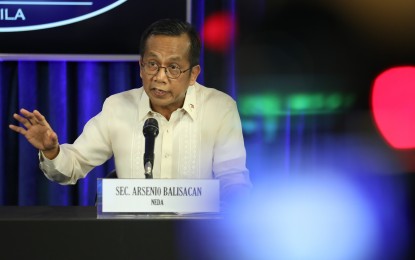
National Economic and Development Authority Secretary Arsenio Balisacan (PNA photo by Rey Baniquet)
MANILA – As the Senate concurred with the ratification of the Regional Comprehensive Economic Partnership (RCEP) Tuesday evening, the Marcos administration’s top economist is optimistic that the new free trade agreement (FTA) will fuel the country’s economic growth.
National Economic and Development Authority (NEDA) Secretary Arsenio Balisacan thanked the Senate for taking the “bold and game-changing move” by concurring with the RCEP ratification that will allow the Philippines to implement the commitments and take advantage of the benefits under the trade pact.
“Finally, the Philippine Senate has ratified the Regional Comprehensive Economic Partnership, providing another engine for growing the economy and making it part of rapidly rising Asia,” Balisacan said in a tweet.
A day before the Senate’s concurrence, the NEDA chief emphasized that RCEP would not lead to an influx of imported agricultural commodities in the country, as only 15 out of 33 tariff lines with reduced rates were agricultural commodity groups.
Department of Trade and Industry (DTI) Secretary Alfredo Pascual, whose agency is at the forefront of negotiating the country’s offensive interest in the RCEP, has welcomed Senate’s nod for the Philippines’ new FTA.
“RCEP is a modern, comprehensive, high-quality, and mutually beneficial economic partnership agreement that will further promote the economic efficiency of member states, strengthening linkages in sectors such as manufacturing, technology, agriculture, natural resources, as well as reinforcing MSME participation in the global value chain networks,” Pascual said in a Facebook post.
READ: Senate ratifies RCEP, eyes creation of oversight panel
The Philippines is the last signatory country that ratified RCEP since it was concluded on Nov. 15, 2020 after eight years of negotiations.
It is a comprehensive trade and investment agreement initiated by the 10 ASEAN members with its FTA partners — China, Japan, South Korea, Australia and New Zealand.
The FTA has entered into force since Jan. 1, 2021 for those participating countries that ratified RCEP early.
DTI Assistant Secretary Allan Gepty told the Philippine News Agency (PNA) in a Viber message that the next step for the government is to deposit the instrument of ratification.
“[T]hen it will take effect 60 days from receipt of the deposit,” said Gepty, who is also the Philippines’ lead negotiator for RCEP.
RCEP is currently the largest regional trade bloc in the world accounting for almost one-third of the world’s global population, gross domestic product, trade, and inward investments.
Among the country’s benefits in joining the RCEP include zero or lower import tariffs for Philippine products that will enter the shores of its free trade partners; wider sourcing of raw materials for Philippine manufacturers; stable and predictable business environment; integrating micro, small, and medium enterprises into the global value chain; allowing Filipino professionals to practice their profession in RCEP areas; stronger protection for intellectual property rights; and access to economic and technical cooperation support to boost the country’s competitiveness, among others.
Twenty senators voted for the concurrence of RCEP’s ratification. Sen. Risa Hontiveros voted no, while Sen. Imee Marcos abstained from voting.
President Ferdinand R. Marcos Jr. has tagged RCEP as one of his administration’s priority measures.
Capitalizing on potential gains
In a separate statement, Department of Budget and Management Secretary Amenah Pangandaman underscored the need to capitalize on the benefits of the trade agreement.
“The RCEP Agreement is an instrument that will further our economic trade with participating Asia-Pacific nations,” said Pangandaman who attended the RCEP deliberations at the Senate session hall on Tuesday.
“We have to capitalize on the benefits of the agreement, as it will help provide the Filipino people with more avenues for better economic opportunities and outcomes. All in pursuit of our Agenda for Prosperity,” she said, referring to the theme of the administration’s eight-point Socioeconomic Agenda and the Medium-Term Fiscal Framework.
She, likewise, thanked the “prompt” and “decisive” action of the Senate to ratify the RCEP.
“We especially thank Senate President Juan Miguel Zubiri and Senate President Pro Tempore Lorna Regina ‘Loren’ Legarda for sponsoring the RCEP ratification and for defending this much-needed agreement for the economy,” she said. “We also thank the House of Representatives under the leadership of Speaker Ferdinand Martin Romualdez for expressing their support for the RCEP Ratification through House Resolution No. 728.” (PNA)
